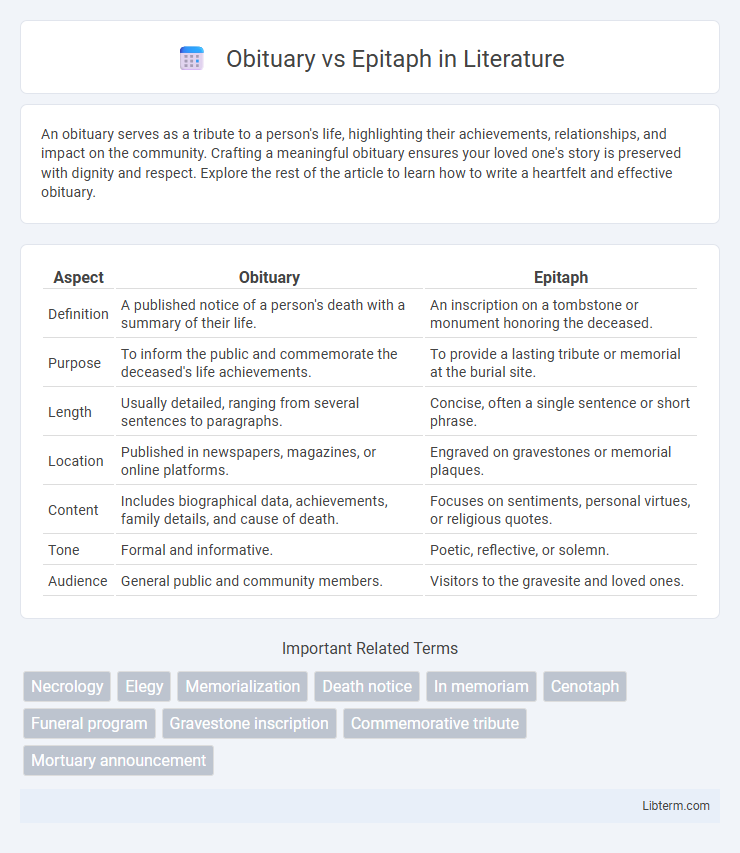An obituary serves as a tribute to a person's life, highlighting their achievements, relationships, and impact on the community. Crafting a meaningful obituary ensures your loved one's story is preserved with dignity and respect. Explore the rest of the article to learn how to write a heartfelt and effective obituary.
Table of Comparison
| Aspect | Obituary | Epitaph |
|---|---|---|
| Definition | A published notice of a person's death with a summary of their life. | An inscription on a tombstone or monument honoring the deceased. |
| Purpose | To inform the public and commemorate the deceased's life achievements. | To provide a lasting tribute or memorial at the burial site. |
| Length | Usually detailed, ranging from several sentences to paragraphs. | Concise, often a single sentence or short phrase. |
| Location | Published in newspapers, magazines, or online platforms. | Engraved on gravestones or memorial plaques. |
| Content | Includes biographical data, achievements, family details, and cause of death. | Focuses on sentiments, personal virtues, or religious quotes. |
| Tone | Formal and informative. | Poetic, reflective, or solemn. |
| Audience | General public and community members. | Visitors to the gravesite and loved ones. |
Understanding Obituary and Epitaph
An obituary is a detailed written notice that announces a person's death, often including biographical information, achievements, and funeral details, serving as a public record and tribute. An epitaph is a brief inscription engraved on a tombstone or memorial, encapsulating the essence of the deceased's life or sentiments in a few poignant words. Understanding the distinction highlights how obituaries provide comprehensive life narratives, while epitaphs deliver concise, enduring memorials.
Definitions: Obituary vs Epitaph
An obituary is a published notice that announces a person's death and summarizes their life achievements, personal details, and funeral arrangements, often found in newspapers or online platforms. An epitaph is a brief inscription engraved on a tombstone or plaque, designed to honor and memorialize the deceased through poetic or concise wording. The obituary serves as a public record and tribute, while the epitaph provides a lasting, physical marker of remembrance at the burial site.
Historical Background of Obituaries and Epitaphs
Obituaries have a rich historical background dating back to ancient Rome, where daily notices called "acta diurna" announced deaths, evolving into detailed biographical notices in newspapers by the 17th century. Epitaphs trace their origins to ancient civilizations such as Egypt and Greece, where inscriptions on tombstones honored the deceased and conveyed messages about their life or virtues. Both serve commemorative purposes, with obituaries providing extensive life narratives and epitaphs offering concise, enduring tributes engraved in stone.
Purpose and Function of an Obituary
An obituary serves as a public announcement of a person's death, providing details about their life, achievements, and surviving family members, while informing the community about funeral arrangements. Its primary function is to celebrate the deceased's legacy and offer closure for friends and relatives. Unlike epitaphs, which are brief inscriptions on tombstones, obituaries are comprehensive narratives published in newspapers or online platforms.
Purpose and Function of an Epitaph
An epitaph serves as a concise inscription on a tombstone or memorial, designed to honor and commemorate the deceased by capturing their essence or legacy in a few meaningful words. Its primary function is to offer a lasting tribute that reflects the individual's character, achievements, or beliefs, often providing comfort and remembrance for surviving loved ones. Unlike an obituary, which provides a detailed narrative of a person's life and death, an epitaph focuses on a symbolic, enduring message that resonates through time.
Key Differences Between Obituary and Epitaph
Obituaries provide detailed information about a person's life, including achievements, family, and funeral arrangements, typically published in newspapers or online. Epitaphs are brief inscriptions engraved on a tombstone or memorial, summarizing the deceased's memory through succinct, often poetic phrases. The key difference lies in length and purpose: obituaries inform the public extensively, while epitaphs offer a concise tribute at the burial site.
Writing Style: Obituary vs Epitaph
Obituaries typically employ a formal, narrative writing style that provides a detailed account of the deceased's life, achievements, and surviving family members, often written in third person. Epitaphs use concise, poetic, or reflective language, designed to capture the essence of a person or their values in just a few words on a gravestone. The obituary's comprehensive structure contrasts sharply with the epitaph's brevity and emotional resonance, reflecting their distinct communicative purposes.
Modern Trends in Obituaries and Epitaphs
Modern trends in obituaries emphasize personalized storytelling, incorporating digital media and social networking platforms to celebrate lives beyond traditional print formats. Epitaphs increasingly reflect contemporary values by using poetry, humor, or meaningful symbols rather than conventional phrases, often designed with laser-engraved technology for durability and clarity. Both obituaries and epitaphs now prioritize unique narratives and visual elements to preserve legacy in digital and physical memorial spaces.
Common Examples of Obituaries and Epitaphs
Common examples of obituaries include detailed life summaries published in newspapers or online memorial sites, highlighting achievements, family members, and funeral arrangements. Epitaphs often consist of brief, poetic inscriptions engraved on tombstones, such as "Rest in Peace" or "Forever in Our Hearts," serving as lasting tributes. Both forms honor the deceased but differ in length, purpose, and placement.
Choosing the Right Words: Obituary or Epitaph
Choosing the right words between an obituary and an epitaph depends on the purpose and audience: an obituary serves as a detailed public notice honoring the deceased's life and achievements, typically published in newspapers or online. An epitaph, conversely, is a concise inscription on a gravestone or memorial that captures the essence of the person's legacy with meaningful brevity. Understanding the distinct roles of obituary and epitaph ensures respectful and appropriate remembrance through carefully selected language.
Obituary Infographic

 libterm.com
libterm.com